- Home
- Anne McCaffrey
To Ride Pegasus Page 9
To Ride Pegasus Read online
Page 9
“What’s that?”
“I apologize, Jerry. Your point is well taken. I’ve erred—on the side of the angels, I hope—but this attitude of mine towards Ruth Horvath is a curious vacillation from my tendency to be forthright. Yet I know that there is a reason to be slightly devious.”
“Then you’ll ease back on this all-open-and-above-board routine?”
“Yes, I’ll ease back as you put it.”
“Still,” and Jerry frowned slightly, “it isn’t as if they won’t find out soon enough.” He meant the Horvaths.
“They need time to get used to the idea.” Op Owen was thinking about humanity.
“Where on earth did she get those blue eyes?” Lajos asked as he sat entranced by his three-month-old daugher’s attempts to capture her toes. She flopped over, gurgling cheerfully to herself.
“Heavens, it’s possible,” Ruth replied, beaming fatuously as she caught her daughter’s eye. “I may be grey-eyed, and you brown, but we both have ancesters with blue eyes—four generations back.”
“I always said you were recessive, hon.”
“Humph. I don’t mind in the least, not if it produces a blue-eyed blonde daughter with dimples. And I’ve got her, haven’t I, love? You’re all mine.”
“Except for the twenty-three chromosomes from me.”
Dorotea twisted her head backwards over her shoulder and burbled moistly at her mother.
“Love at first bite,” Lajos said in a mutter of mock surliness. “There’s a conspiracy of females against this poor lone male.”
Dorotea impartially gurgled at him, her eyes bright and wide and happy.
“You never had it so good,” said Ruth.
And Lajos privately admitted the truth of that. Ruth was so enthralled with her daughter, their apartment had a noticeable atmosphere of benevolence. He was more relaxed than ever, and despite an increase in Incidents, extending beyond his usual affinity, he suffered less from the depressions and exhaustions that were the inevitable postlude.
The day Dorotea’s Talent blossomed, Daffyd op Owen was reviewing the records obtained overtly and covertly from the Horvath apartment He’d had Lester Welch, his electronic chief, rig a buried web in Ruth’s mattress, in case the baby instinctively contacted her mother first. However, Lester had pointed out the slight variation in Ruth’s readings. It was more as if the needle had snagged itself on an imperfection in the graph paper. There was no such variation on the baby’s recordings. Welch had been about to discredit the occurrences until he checked them against Lajos’s and discovered that the minute variations in Ruth’s chart always occurred exactly at the onset of Lajos’ Incidents.
“She might well be a latent ‘receiver,’ ” op Owen said to Welch, “only now beginning to develop from continued proximity to her husband and the advent of the child. I can’t present another explanation.”
“That’d be nice, Dave. Ruth’s a good little person: cheerful, intelligent and crazy for her husband and child. Just the sort of well-balanced, understanding parent to have for a …”
Lesto was abruptly staring at op Owen’s retreating back. The man had leaped to his feet and raced down the hall to the recording room. Lester Welch was not Talented, although his electronic engineering was often sheer inventive genius, but op Owen didn’t react like that without good cause. When Welch reached the doorway, he saw that Charlie Moorfield, the day engineer, was hunched over the console, unconscious, but op Owen’s attention was for a graph.
“Take a close look at Dorotea’s graph,” op Owen said, grinning fit to pop his jaw, and then he passed his associate on his way out.
Common sense told op Owen that, despite the urgency of the summons, there could be no danger threatening the baby. Yet he could not disregard that call. What could have happened, he wondered as he ran down the front steps. Suddenly he noticed that there seemed to be a mass exodus from all parts of the building. And everyone was headed in the same direction. As abruptly as the call had been issued, it ceased. People slowed down, stopped, looked around, grinning foolishly.
“What was that?” “Who called?” “Wot hoppened?”
“It’s all right,” op Owen found himself reassuring them. “A new technique improperly shielded,” he said to the telepaths. And grinned at his own dissembling as he continued towards the Horvaths’s apartment.
There was a crowd in the hall before their apartment. Op Owen politely pushed his way through the disturbed residents. Dorotea, her baby face still tear-streaked, was held high in her mother’s arms, cooing and chortling at the smiling faces around her. Op Owen’s arrival signaled the crowd’s discreet dispersal and shortly, he was alone with the mortified mother.
“I’m so embarassed, sir,” Ruth said, jiggling her baby as she walked nervously up and down her living room. “I fell asleep with the tape recorder blaring away. And I just … didn’t hear Dorotea wake up … I’ve never done such a thing before and we’ve never permitted her to cry long …”
“No one is remotely suggesting that you mistreat Dorotea.” Op Owen smiled as the baby flirted delight fully with him. “In fact a little honest frustration is very useful. It certainly placed her Talent.”
“Ooooooooh,” and Ruth collapsed on the sofa, staring wide-eyed at Daffyd op Owen as she absorbed the implication, which she had been too preoccupied with calming Dorotea to see.
“She broadcast a very loud signal. I shouldn’t be at all surprised if every Talent in the city heard her.”
No sooner were the words out of his mouth than Lajos charged through the door.
“What happened to her? How did she get hurt? My head is splitting!” Lajos snatched Dorotea from her mother’s lap to Cramme her firsthand. She began to whimper, catching his anxiety.
“Only her feelings were hurt,” Ruth replied, suddenly very calm. Op Owen noticed that with approval: she was dampening her own distress to soothe the others. “I’d fallen asleep with the tape recorder blasting away and just didn’t hear her when she woke up hungry and all damp.” She took her daughter back, rocking her until the baby began to beam again. “She was hurt because she felt she was being ignored, isn’t that right, sweetie?”
“Well, good god!” Lajos sank onto the couch, mopping his forehead. “I never heard anything like it before. Sir,” and he turned to op Owen, “look, this can’t … I mean, can this sort of thing happen every time my daughter’s upset?”
“Oh, I’m sure she’s likely to protest many assumed indignities, Lajos. Babies have to suffer some frustrations to grow. We’ll just move you all to a shielded apartment and dampen down that lovely loud young voice.”
“You’re not surprised about Dorotea at all,” Ruth said, regarding op Owen with round, suspicious eyes. “So that’s why everyone was so excited about her in the nursery.”
“Well, yes,” the Director agreed slowly. “She was heard by the TP nurse at birth.”
“But I thought psionic Talents don’t usually show up until adolescence …”
“Conscious Talent,” op Owen said, correcting her.
Ruth looked down at the drooling baby in her arms. A strained look crossed her pretty face. “But I want Dorotea to have a normal, happy childhood!”
“And she won’t because she’s Talented? Is that it, my dear?” Op Owen knew, sadly, that his instinct about not telling Ruth at once had been all too well-founded “Except for this ability, which might as well be drawing freehand, she is a normal, healthy child, totally unaware that she is in any way remarkable …”
“But I know you’ll want to test her, and all that, with stimuli …” Ruth’s distress was so acute that she couldn’t go on.
“Ruth!” Lajos bent to comfort her, surprised by her reaction. She clutched her daughter tightly to her.
“My dear Ruth!” op Owen said gently, “testing and stimuli are for people who come to us after they have subverted and suppressed their Talents. We know what Dorotea is already, a very strong telepath. And we’ve been ‘testing’ her, as
you call it, already. As for stimuli, I assure you,” and there was nothing forced in op Owen’s chuckle, “she’s applying the only stimuli … to us.”
Lajos laughed, brushing his hair back from his forehead as he remembered his frantic homeward flight. Beneath his arm, he could feel Ruth relaxing. A slight smile touched her lips.
“Dorotea will have an unusual opportunity, my dear. One denied you and Lajos, and myself, and so many other potential Talents. She has the chance to grow up in her Talent learning to use it as naturally as she learns to walk and talk. We will all help her to understand it … as much as we do ourselves,” he added with a wry smile. “To be candid, Ruth, we are in much the same position as your daughter. We are all learning to act in a publicly acceptable fashion with this new facet of human evolution. Psionic Talents are in their infancy, too, you know.
“You might even extend the analogy a little to include the Andres Bill, which we hope will afford all Talents professional status and legal protection. We, in effect must prove to the public, our parent-body, if you wish, that we are not ‘bad,’ ‘naughty’ or ‘capricious’ children. Dorotea has already contributed something to that end,” and op Owen caught himself before he explained his own revelation. “Dorotea needs love and reassurance, discipline and understanding. Shell pick that up from you, Ruth, with your warmth and sweetness. I want her, possibly more than you do, to have a normal, happy childhood so that she will be a normal, happy adult.”
He rose, smiling at the baby’s infectious gaiety.
“See, she knows how pleased we are with her right now, the little rascal.”
Op Owen left, assuring them new quarters within the week. Ruth was so quiet and thoughtful that Lajos remained home the rest of the day. He found the revelation of Dorotea’s Talent as much a shock as Ruth apparently did. However, by morning, he was consumed with a paternal pride and, in the succeeding days, discovered an overweening tendency to maunder on about his daughter’s prowess. By the time they moved to the larger, shielded apartment he was accustomed to the notion and, since Dorotea made no more frantic summonses, succeeded in ignoring it. Until he noticed the gradual change in Ruth. At first, it was no more than a sudden frown, quickly erased, or a nervous look towards the baby’s room if she slept longer than usual. Then he caught Ruth looking at her child with that wary expression he had once privately called the Freak Look,’ which unTalented people occasionally directed at him when they discovered his affiliation with the Center.
“You’ve got to stop that, honey,” he blurted out. “You’ve got to keep thinking … strongly … that Dorotea is just like other kids. Or you’ll prejudice her. Which is the one thing we have to avoid.”
Ruth vehemently denied the accusation but she turned so white around the lips that Lajos gathered her quickly into his arms.
“Ah, sweetie, she hasn’t changed just because we’ve found out she’s Talented. But she is perceptive and she can sense your feelings towards her. You start suppressing that ‘freak-feeling’ right now. You think positively that she’s our beautiful baby girl, sweet and loving, kind and thoughtful. She’ll have that opinion of herself and it won’t matter that she’s a strong TP as well. She’ll merely consider that part of the whole bit. It’s when she senses criticism and restraint and hypocrisy that we’ll be in trouble. I had to get used to it, too, Ruthie. Say,” and he tilted her chin up and grinned down at her reassuringly, “why don’t we get a little help from op Owen? Talk this over with him. He can put a block on if you need one.”
The very suggestion that she couldn’t love and understand her own child made Ruth indignant. She’d had years of parent training. She understood every phase of early childhood development. She adored Dorotea and she certainly wouldn’t do a thing that might jeopardize her daughter’s happiness. They both felt better after such a candid discussion and the problem was shelved.
“Sir, I thought you ought to see the Horvath charts,” Lester Welch told op Owen. “A variation keeps appearing in Ruth Horvath’s. See?” and Welch unrolled the paper, pointing here and there to the almost imperceptible alteration in Ruth’s normal pattern. “See, here and here, it’s a couple of microseconds longer and broader. It begins to broaden minutely until it hits this frame which has remained constant. Now, compare her time-sequence to Lajos’s … and remember we’re picking up her pattern anywhere in the new apartment just as we pick up his from the office.”
Op Owen saw the correlation immediately.
“He’s finished no precog in six weeks?”
Welch contented himself with a nod as op Owen studied the graphs.
“If I didn’t think it was impossible, I’d say Ruth was suppressing him. But how?”
“Don’t you mean why?”
“That, too, of course, but ‘how’ is the bigger question.”
“If you mean the type of pattern, Dave, I can’t give you that. There isn’t enough to identify it as a known variation.”
“That wasn’t exactly what I meant, although I would like a magnification of this to study. Can you put on a more sensitive gauge, or a faster needle, to lengthen the stroke?”
“Hmmm.” Welch considered the suggestion. “I’ll rig up something. I guess.”
Op Owen chuckled. “One of the comforting things about you, Les, is your unfailing rise to the challenge. I don’t believe you know what failure is.”
Welch regarded his superior with some surprise. “Failure is an inability to consider what is not presently known. Like Ruth Horvath’s variation?” Then he added, “Or Senator Zeusman’s strategy?”
Op Owen dismissed that with a wave of his hand and continued to scan the Horvaths’ readings. “Dorotea’s first Incident rocked him, didn’t it?”
“Yes, it shows up in his sleep pattern as unusual restlessness the first nights, but see, he’s calming down by the third.”
“It’s from that date that his precogs begin to dwindle.”
“By God, you’re right. I thought he’d be too stable for a deviation like that.”
“Yes, he’s been too consistent a precog. I think I’ll call him in and drop a few leading questions to see what reaction I get.” Op Owen initiated the call then and there.
“There’s nothing wrong with Dorotea, is there, sir?” Lajos asked as soon as he entered the office.
“Good heavens, no,” Daffyd op Owen said, gesturing Lajos to a chair.
“It’s about my drop in Incidents, then, isn’t it?”
Op Owen eyed his young colleague for a moment, savoring the peripheral emotions the man was generating. It took no Talent to recognize the defensive nervousness in Lajos’s attitude.
“Not exactly. There are always periods of rest for precogs, caused by any number of valid reasons, including the absence of fires. However, your graphs show an onset of Incidents, broken off just as they begin.”
“Once or twice in the office, I’ve felt as if something was preventing me …”
“Preventing you …?” Op Owen prompted Lajos gently as he had broken off, startled by his own phrasing.
“Yes, sir,” Lajos went on slowly, “it’s as if something’s preventing me from previewing. Sort of like … glancing into a strange room and having the door slammed in your face.”
“Aptly put. Could you suggest why … or perhaps what … is preventing you?”
“You think it’s a psychological suppression, don’t you?”
“That’s my first thought.”
Indignation and disbelief were Lajos’s instant reaction.
“Why would I want to suppress suddenly?”
“Something you yourself don’t want to see. Precog is not the easiest of Talents, Lajos,” op Owen replied. “Often the precog imposes his own block, as a relief from the psychological pressures.”
“If you think there’s a chance that I’m developing the Cassandra complex …” Lajos was heatedly provoked now.
“No, that follows an entirely different pattern.”
“Dorotea’s prevent
ing me?”
“If this occurred only in your home environment, we’d have to seriously consider the possibility. But it’s improbable for a variety of reasons: the prime one being that her room is shielded to protect her from overtones of your precogs as much as to protect us from her blatant calls.”
“Ruth?” Lajos’s hushed question had the power of a shout. “She is Talented after all. But why suppress me? She loves me. I know she does. She’s always helped with Incidente. It made her feel a part …” Lajos stared at op Owen. Then shook his head, violently disagreeing with the natural conclusion. “No! I don’t see why suppressing me would … do her any good.”
“Has something else upset her? The suppression starts not long after Dorotea’s first Incident.”
Lajos covered his eyes, groaning deeply. He collected himself almost immediately and, looking up at op Owen, recounted Ruth’s curious uncertainty about Dorotea.
“Yes, I see now what has possibly happened. She’s made you her whipping boy.”
“Now wait a minute, sir. Ruth’s not petty or vindictive.”
“I’m not for a moment implying that she is, Lajos. Let us both try to see her conflicts. She’s had to make so many adjustments. She had such hopes when she entered the training program. I remember her cheerfulness and vivacity so well. It was difficult to have to disillusion her. You two married and she has exhibited skill in assisting you. But even the most generous soul experiences twinges of envy. She looked forward to maternity as an outlet for her natural inclination and the assuagement of her failures. Suddenly she finds herself with the extraordinary daughter who makes even the Director of the Center jump at her whim.” Lajos weakly returned op Owen’s smile. “I thought at the time she was very much distressed at the thought of relinquishing any of Dorotea’s care to our impersonal toils. I don’t believe we entirely relieved her fear that the Center will usurp her role in her daughter’s upbringing. Can you see why she may be indirectly punishing you for circumstances that threaten her happiness?”
“Yes, I can.” Lajos’s admission was dejected.

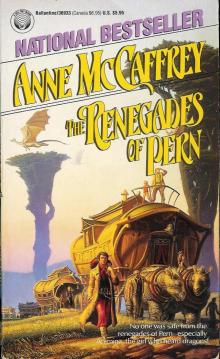 The Renegades of Pern (dragon riders of pern)
The Renegades of Pern (dragon riders of pern)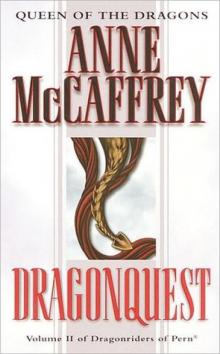 Dragonquest
Dragonquest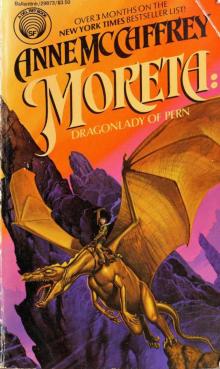 Moreta (Dragonlady of Pern)
Moreta (Dragonlady of Pern)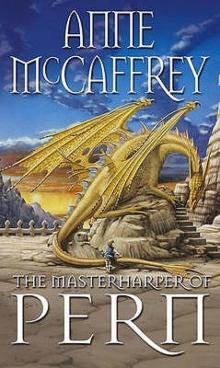 The Masterharper of Pern
The Masterharper of Pern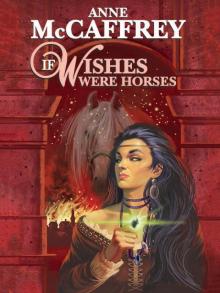 If Wishes Were Horses
If Wishes Were Horses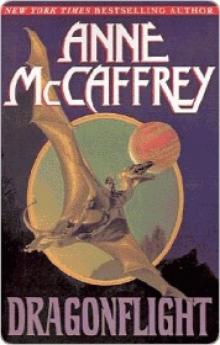 Dragonflight
Dragonflight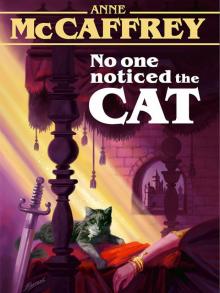 No One Noticed the Cat
No One Noticed the Cat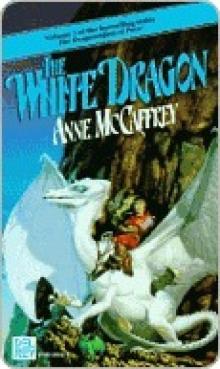 The White Dragon
The White Dragon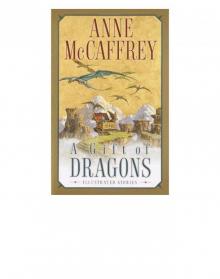 A Gift of Dragons
A Gift of Dragons Harper Hall - Dragonsong
Harper Hall - Dragonsong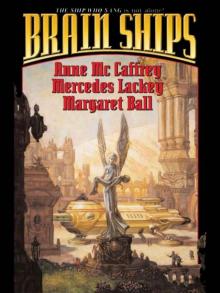 Brain Ships
Brain Ships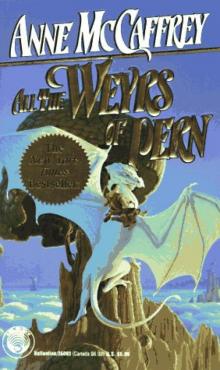 All The Weyrs of Pern
All The Weyrs of Pern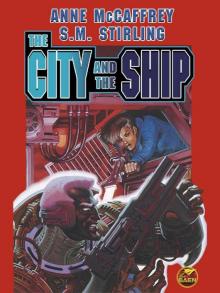 The City and the Ship
The City and the Ship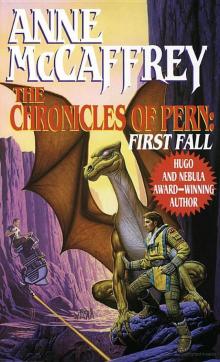 The Chronicles of Pern: First Fall
The Chronicles of Pern: First Fall Acorna’s Search
Acorna’s Search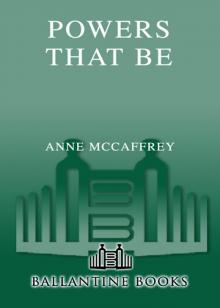 Powers That Be
Powers That Be Second Wave
Second Wave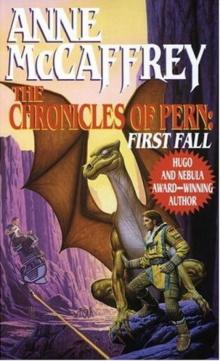 Chronicles of Pern (First Fall)
Chronicles of Pern (First Fall)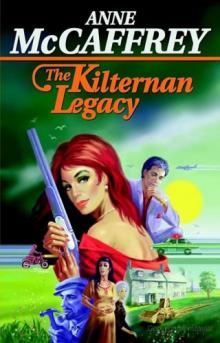 The Kilternan Legacy
The Kilternan Legacy Decision at Doona
Decision at Doona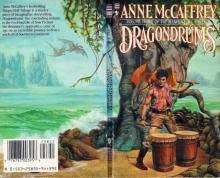 Dragondrums (dragon riders of pern)
Dragondrums (dragon riders of pern)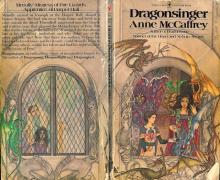 Dragonsinger (dragon riders of pern)
Dragonsinger (dragon riders of pern)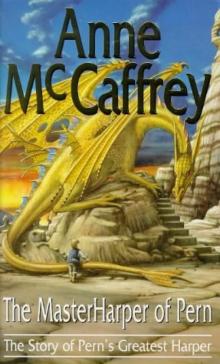 The Master Harper of Pern
The Master Harper of Pern Crystal Singer
Crystal Singer Acorna’s People
Acorna’s People Pegasus in Flight
Pegasus in Flight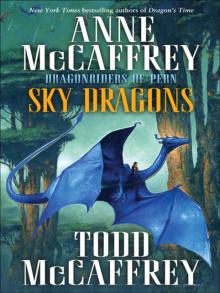 Sky Dragons Dragonriders of Pern
Sky Dragons Dragonriders of Pern Dragonriders of Pern 4 - Dragonsinger
Dragonriders of Pern 4 - Dragonsinger Treaty at Doona
Treaty at Doona Damia's Children
Damia's Children Stitch In Snow
Stitch In Snow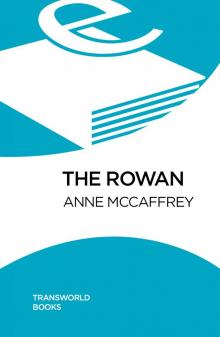 The Rowan
The Rowan Dinosaur Planet
Dinosaur Planet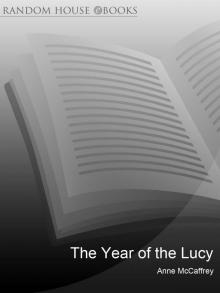 The Year of the Lucy
The Year of the Lucy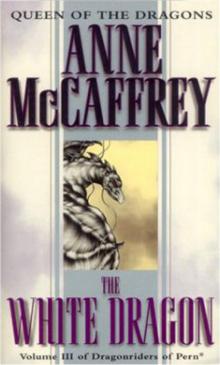 The White Dragon p-4
The White Dragon p-4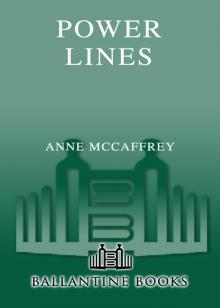 Power Lines
Power Lines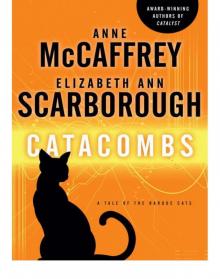 Catacombs
Catacombs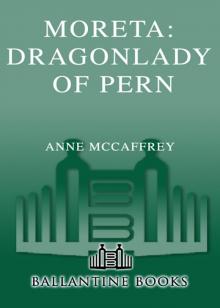 Moreta
Moreta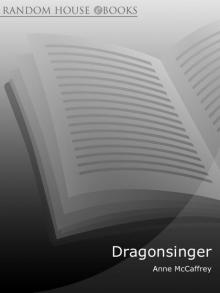 Dragonsinger
Dragonsinger Crystal Line
Crystal Line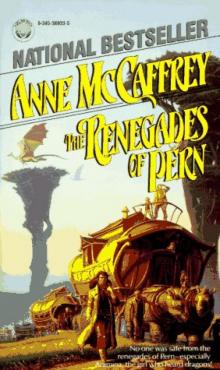 The Renegades of Pern
The Renegades of Pern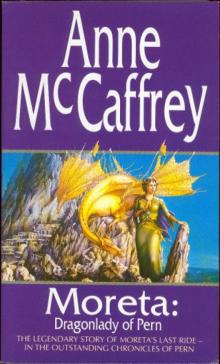 Moreta - Dragonlady of Pern p-8
Moreta - Dragonlady of Pern p-8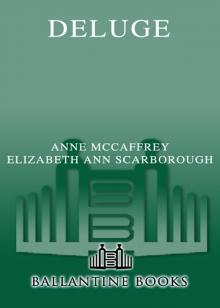 Deluge
Deluge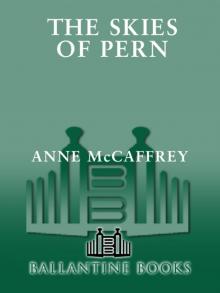 The Skies of Pern
The Skies of Pern Acorna's Quest
Acorna's Quest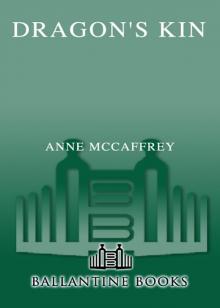 Dragon's Kin
Dragon's Kin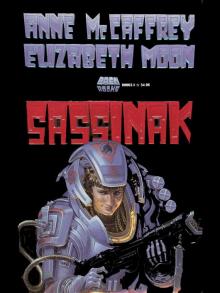 Sassinak
Sassinak![Crystal Universe - [Crystal Singer 03] - Crystal Line Read online](http://i1.bookreadfree.com/i1/03/31/crystal_universe_-_crystal_singer_03_-_crystal_line_preview.jpg) Crystal Universe - [Crystal Singer 03] - Crystal Line
Crystal Universe - [Crystal Singer 03] - Crystal Line Freedom's Landing
Freedom's Landing Acorna’s Quest
Acorna’s Quest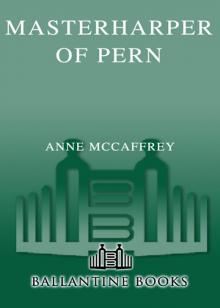 Masterharper of Pern
Masterharper of Pern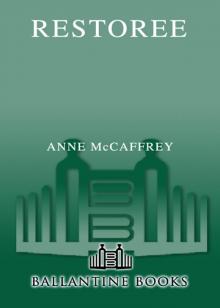 Restoree
Restoree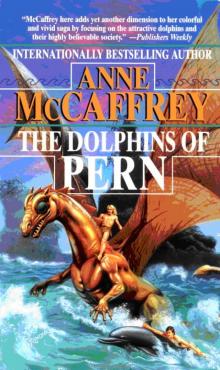 Dolphins of Pern
Dolphins of Pern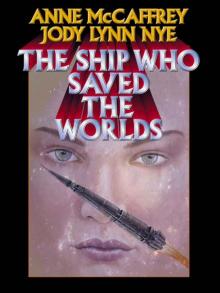 The Ship Who Saved the Worlds
The Ship Who Saved the Worlds Acorna's Triumph
Acorna's Triumph Acorna's Rebels
Acorna's Rebels![[Acorna 08] - First Warning: Acorna's Children (with Elizabeth Ann Scarborough) Read online](http://i1.bookreadfree.com/i1/04/06/acorna_08_-_first_warning_acornas_children_with_elizabeth_ann_scarborough_preview.jpg) [Acorna 08] - First Warning: Acorna's Children (with Elizabeth Ann Scarborough)
[Acorna 08] - First Warning: Acorna's Children (with Elizabeth Ann Scarborough)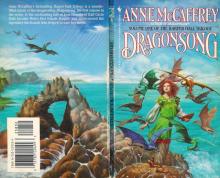 Dragonsong (dragon riders of pern)
Dragonsong (dragon riders of pern) Dragonriders of Pern 6 - Dragondrums
Dragonriders of Pern 6 - Dragondrums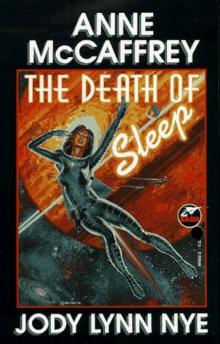 The Death of Sleep
The Death of Sleep Crisis On Doona
Crisis On Doona Nimisha's Ship
Nimisha's Ship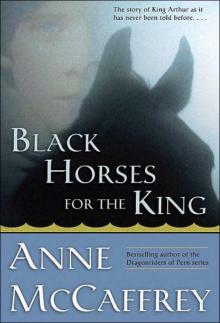 Black Horses for the King
Black Horses for the King Changelings
Changelings Freedom's Choice
Freedom's Choice The Lady
The Lady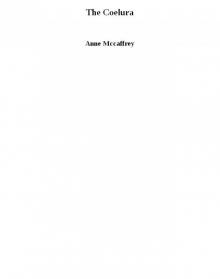 The Coelura
The Coelura Catalyst
Catalyst The Unicorn Girl
The Unicorn Girl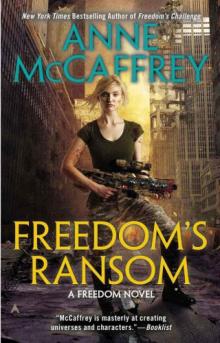 Freedom's Ransom
Freedom's Ransom Nerilka's Story
Nerilka's Story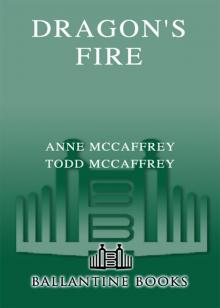 Dragon's Fire
Dragon's Fire Generation Warriors
Generation Warriors Lyon's Pride
Lyon's Pride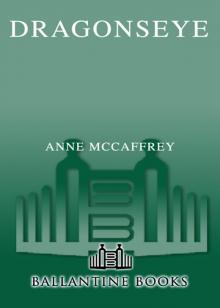 Dragonseye
Dragonseye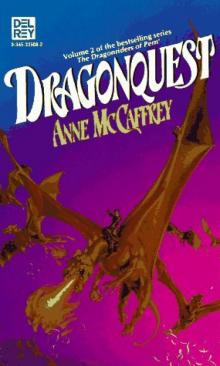 Dragon Quest
Dragon Quest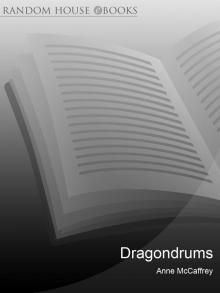 Dragondrums
Dragondrums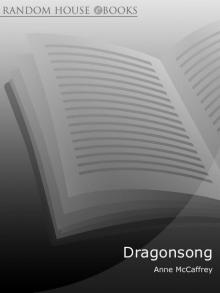 Dragonsong
Dragonsong The Mystery of Ireta
The Mystery of Ireta Dolphins' Bell
Dolphins' Bell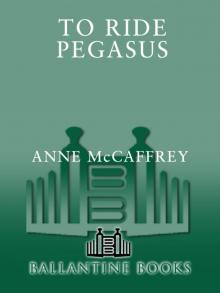 To Ride Pegasus
To Ride Pegasus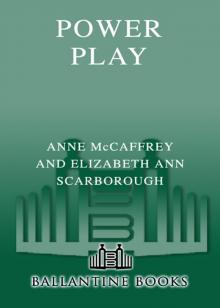 Power Play
Power Play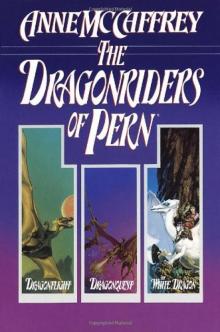 The Dragonriders of Pern
The Dragonriders of Pern An Exchange of Gifts
An Exchange of Gifts The Ship Who Sang
The Ship Who Sang Sky Dragons: Dragonriders of Pern
Sky Dragons: Dragonriders of Pern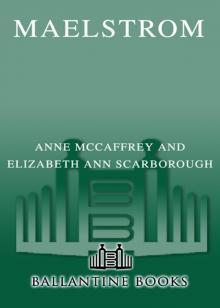 Maelstrom
Maelstrom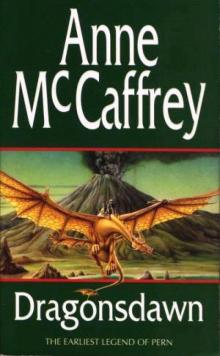 Dragons Dawn
Dragons Dawn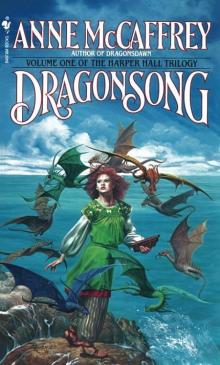 Dragon Song
Dragon Song The Ship Who Searched b-3
The Ship Who Searched b-3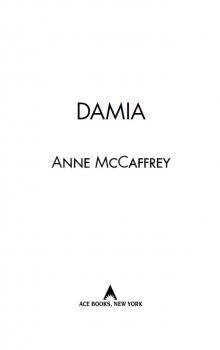 Damia
Damia Freedom's Challenge
Freedom's Challenge